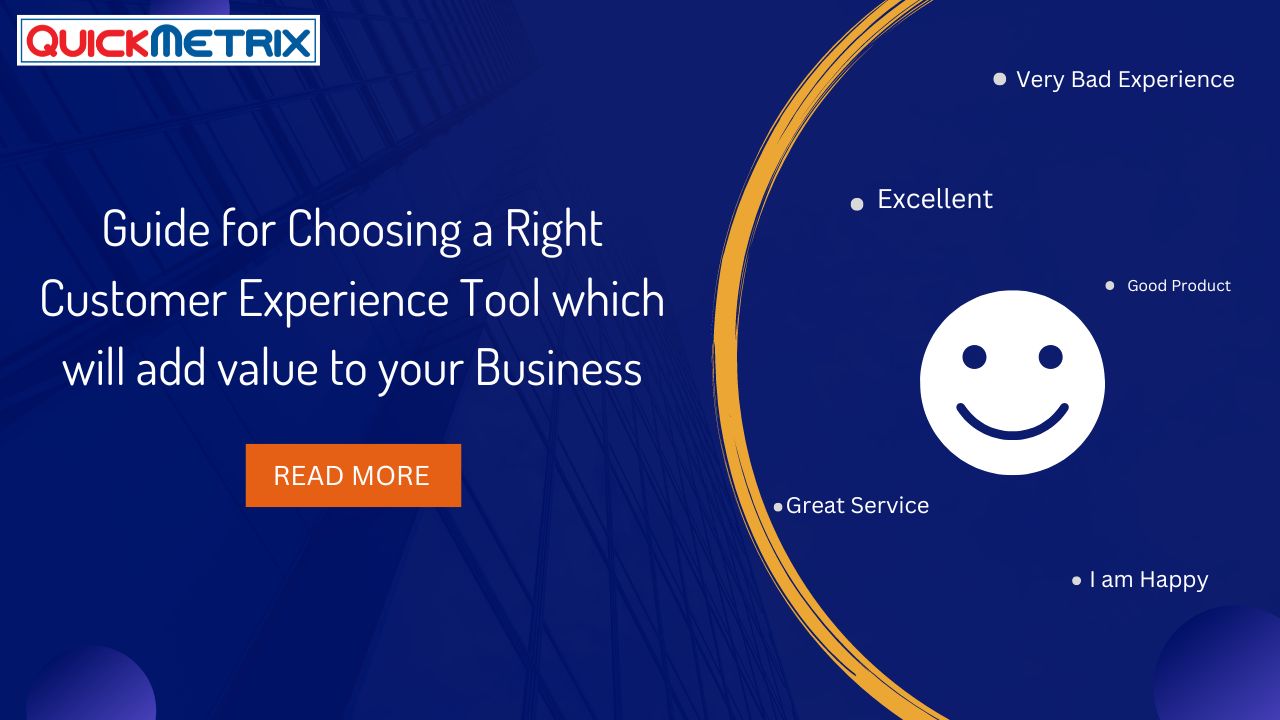Customer Experience Management Platform
Choosing the right customer experience tool is essential for any business that wants to provide exceptional service and increase customer satisfaction. Here are some steps to help you choose the right customer experience tools:
- Identify your business needs: Determine the specific areas where you need to improve your customer experience. This could include customer feedback, social media engagement, customer service, or website analytics.
- Research available tools: Once you have identified your business needs, research the various tools available in the market that can help you improve your customer experience. Look for reviews, case studies, and customer testimonials to evaluate the effectiveness of each tool.
- Evaluate the features: Evaluate the features of each tool and determine if they meet your business needs. Look for features such as customer feedback management, social media monitoring, customer service ticketing, and analytics.
- Consider integration: Check if the tools can integrate with your existing systems such as your CRM or marketing automation platform. Integration can help you streamline your workflow and improve efficiency.
- Check for scalability: Ensure that the tools you select can scale up or down according to the changing needs of your business. You may need to add or remove features, users, or channels as your business grows.
- Check for support: Look for tools that offer excellent customer support and training to help you make the most of the features and benefits.
By following these steps, you can choose the right tools that can help you improve your customer experience and drive business growth.
Introducing Customer Experience
Customer experience (CX) is the culmination of all interactions between a business and its clients. It includes the customer’s perception of their experience with your brand, product or service.
Customer experience is important because it has an impact on your overall business success. For example:
- Customers who are satisfied with their experiences are likely to recommend you to others. This can lead to increased sales and growth in market share over time.
- Customers who aren’t happy with their experiences may stop buying from you altogether–or even spread negative word-of-mouth about your brand that damages its reputation among other potential customers.
The 10 Best Customer Experience Platforms in 2023
-
- Salesforce Service Cloud
- Zendesk
- Freshdesk
- HubSpot
- Genesys
- Pegasystems
- Qualtrics
- Medallia
- Clarabridge
Features and Benefits of CX Enterprise Software Platforms
- Social media management and monitoring.
- Analytics.
- Engagement.
- Customer service automation, including chatbots and virtual agents that can be used to answer common questions from customers in real time or schedule appointments with a human agent when needed.
- Customer segmentation–the process of dividing customers into groups based on their needs, interests, demographics or behaviors so you can better understand them and deliver personalized experiences accordingly (e.g., “We know that people who buy our product are interested in sports; let’s send them an email about our new basketball shoe”).
- Data visualization tools that allow you to see all your data at once on one screen instead of having to go through multiple reports or spreadsheets (which makes it easier for employees across departments within an organization). These tools also allow employees access specific information they need without having access rights set up beforehand–for example: If someone doesn’t have access rights but needs something specific right now anyway (like customer feedback), then he/she could just pull up those results without having any trouble doing so! This feature is especially useful if there are lots of new hires within an organization because we all know how difficult it can be keeping track of everything happening within such large groups.”
Improving customer experience (CX) is crucial for the success of any business, regardless of size, industry, or location. Here are some reasons why improving customer experience is important for businesses:
Customer Retention: Customers are more likely to stay loyal to a company that provides a positive customer experience. A happy customer will continue to use a company’s products or services and may even recommend the company to others.
Increased Revenue: Satisfied customers are more likely to make repeat purchases and are more likely to spend more per transaction. They may also be more likely to try new products or services offered by the company.
Competitive Advantage: In today’s competitive marketplace, companies that prioritize customer experience can stand out from their competitors. Providing a better customer experience can be a key differentiator for businesses.
Brand Reputation: A positive customer experience can enhance a company’s reputation and lead to positive word-of-mouth recommendations. On the other hand, negative customer experiences can quickly damage a company’s image and reputation.
Cost Savings: Improving customer experience can also lead to cost savings for businesses. Satisfied customers require less support and are less likely to return products or request refunds. This can save companies time and money on customer service and support.
Rise of Customer Experience Management Platform
The rise of customer experience management platforms can be attributed to the need to create a better customer experience, lower costs, improve customer loyalty, and gain a competitive advantage. These platforms help businesses understand their customers more deeply and create a seamless experience across digital channels.
According to a McKinsey report, companies have invested heavily in tools and technologies to understand their customers more deeply, and to gain the advantages of superior customer experience (CX). As leaders strive to form a more complete picture of customer preferences and behaviors, they continue to rely on aging survey-based measurement systems that have formed the backbone of CX for decades.
Customer experience is proving to be a critical factor in the success of brands in several ways. By providing a positive and memorable experience to customers, brands are more likely to retain their loyalty and encourage repeat business. Additionally, satisfied customers are more inclined to leave positive reviews and recommendations, thereby attracting new customers and boosting brand reputation. Brands that prioritize customer experience can also gain valuable insights into customer preferences and behavior, which can inform product development and marketing strategies. Ultimately, a focus on customer experience can lead to increased customer satisfaction, loyalty, and revenue for brands.
In summary, improving customer experience is essential for businesses that want to thrive in today’s competitive marketplace. By prioritizing customer experience, companies can improve customer retention, increase revenue, gain a competitive advantage, enhance their reputation, and save costs.



![Elevating Customer Engagement: 11 Top Platforms in 2024 [+User Reviews] 8 Online reputation management tools](https://quickmetrix.com/wp-content/uploads/2024/04/Ivory-Aesthetic-Study-Vlog-YouTube-Thumbnail--770x465.jpg)

